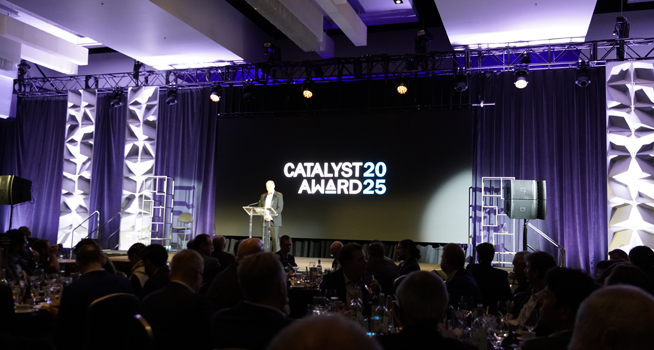SCHOTT has been honoured with the SPIE Catalyst Award for its ground-breaking achievement in producing optical glass using 100 percent hydrogen as a fuel source. Over six years of research, the project progressed from small-scale trials to full-scale production, achieving seamless transitions to hydrogen while maintaining high glass quality. A three-day continuous run at an industrial scale last March demonstrated that glass can be produced without compromising quality.
The SPIE Catalyst Award, in its second year, celebrates organizations that make significant contributions to environmental sustainability. SCHOTT’s pioneering efforts in decarbonizing high-temperature glass melting — a process requiring temperatures of up to 1,700 degrees Celsius — set a new benchmark for sustainability in glass production.
The large-scale use of hydrogen in glass production is technologically very demanding and has not yet been attempted by any company.
SCHOTT’s infrastructure, including a 5,000 Nm3 hydrogen tank and adapted burner systems, allowed for stable melting with hydrogen. Initial tests on a production tank at 35 percent hydrogen admixture over a four-week period, followed by 100 percent hydrogen firing on an optical glass tank, demonstrated that hydrogen can replace natural gas entirely.
“Earning the SPIE Catalyst Award underscores our commitment to leading innovations for a carbon reduced glass production,” said Jonas Spitra, Head of Sustainability Communications at SCHOTT. “This recognition reaffirms our belief that decarbonizing glass production is not only possible but critical to a sustainable future. At SCHOTT, we will continue to develop further technological solutions on our journey.”
Since 2021, SCHOTT has used 100 percent green electricity and aims to continue its sustainability efforts, reimagine how glass is made. To date, SCHOTT’s tests have relied on gray hydrogen due to limited access to green hydrogen.
“We have strongly invested in our R&D and have proven that we can produce the same high-quality glasses. The current lack of a viable infrastructure and competitive pricing for green hydrogen however present challenges to further scale up our testing,” added Jonas Spitra. “We now urge policy-makers to establish improved framework conditions to further drive innovative ideas.”
With a possible future ramp-up of green hydrogen production, SCHOTT is well-positioned to handle further production.





